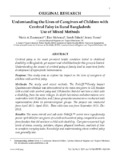Understanding the lives of caregivers of children with cerebral palsy in rural Bangladesh: use of mixed methods
Date
2015-06Publisher
© 2015 Action for Disability Regional Rehabilitation CentreMetadata
Show full item recordCitation
Zuurmond, M. A., Mahmud, I., Polack, S., & Evans, J. (n.d.). Understanding the Lives of Caregivers of Children with Cerebral Palsy in Rural Bangladesh: Use of Mixed Methods, 26(2), 5–21. http://doi.org/10.5463/DCID.v26i2.414Abstract
Cerebral palsy is the most prevalent health condition linked to childhood
disability in Bangladesh, yet support and rehabilitation for this group is limited.
Understanding the impact of cerebral palsy at family level is important forthe
development of appropriate interventions.
Purpose: This study aims to explore the impact on the lives of caregivers of
children with cerebral palsy.
Methods: The study used mixed methods. The PedsQL™Family Impact
Questionnaire Module was administered to the main caregivers in 135 families
with a child with cerebral palsy and 150 families that did not have a child with
a disability, from the same villages. In-depth interviews and observations were
undertaken with 10 families, and 2 focus group discussions were conducted with
representatives from 14 parent/caregiver groups. The project was conducted
from April 2011- April 2013. Data collection was from September 2011- Dec
2012.
Results: The mean overall and sub-scale PedsQL™ scores were significantly
poorer (p<0.001) for caregivers of a child with cerebral palsy compared to scores
from families that did not have a child with disability. Caregivers reported high
levels of stress, anxiety, isolation, stigma, physical tiredness, and lack of time
to complete everyday tasks. Knowledge and understanding about cerebral palsy
was generally low.
Conclusion: This study demonstrates the particular vulnerability of families of
children with disabilities in resource-limited settings. It reveals the extent of the
impact on the caregivers. Interventions therefore need to be holistic, addressing
the well-being and empowerment of caregivers as well as children.
Description
Includes bibliographical references (page 19-21).Publisher Link
http://dcidj.org/article/view/414Department
James P Grant School of Public Health, BRAC UniversityType
ArticleCollections
- Article [5]
- Faculty Publications [111]
- Journal Articles (2015) [9]

